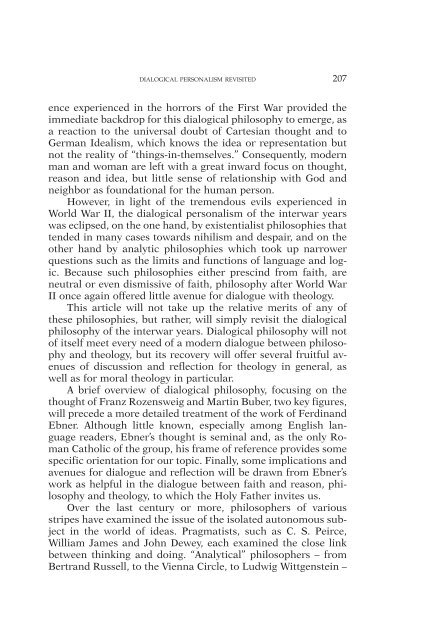Avant-propos - Studia Moralia
Avant-propos - Studia Moralia
Avant-propos - Studia Moralia
You also want an ePaper? Increase the reach of your titles
YUMPU automatically turns print PDFs into web optimized ePapers that Google loves.
DIALOGICAL PERSONALISM REVISITED 207<br />
ence experienced in the horrors of the First War provided the<br />
immediate backdrop for this dialogical philosophy to emerge, as<br />
a reaction to the universal doubt of Cartesian thought and to<br />
German Idealism, which knows the idea or representation but<br />
not the reality of “things-in-themselves.” Consequently, modern<br />
man and woman are left with a great inward focus on thought,<br />
reason and idea, but little sense of relationship with God and<br />
neighbor as foundational for the human person.<br />
However, in light of the tremendous evils experienced in<br />
World War II, the dialogical personalism of the interwar years<br />
was eclipsed, on the one hand, by existentialist philosophies that<br />
tended in many cases towards nihilism and despair, and on the<br />
other hand by analytic philosophies which took up narrower<br />
questions such as the limits and functions of language and logic.<br />
Because such philosophies either prescind from faith, are<br />
neutral or even dismissive of faith, philosophy after World War<br />
II once again offered little avenue for dialogue with theology.<br />
This article will not take up the relative merits of any of<br />
these philosophies, but rather, will simply revisit the dialogical<br />
philosophy of the interwar years. Dialogical philosophy will not<br />
of itself meet every need of a modern dialogue between philosophy<br />
and theology, but its recovery will offer several fruitful avenues<br />
of discussion and reflection for theology in general, as<br />
well as for moral theology in particular.<br />
A brief overview of dialogical philosophy, focusing on the<br />
thought of Franz Rozensweig and Martin Buber, two key figures,<br />
will precede a more detailed treatment of the work of Ferdinand<br />
Ebner. Although little known, especially among English language<br />
readers, Ebner’s thought is seminal and, as the only Roman<br />
Catholic of the group, his frame of reference provides some<br />
specific orientation for our topic. Finally, some implications and<br />
avenues for dialogue and reflection will be drawn from Ebner’s<br />
work as helpful in the dialogue between faith and reason, philosophy<br />
and theology, to which the Holy Father invites us.<br />
Over the last century or more, philosophers of various<br />
stripes have examined the issue of the isolated autonomous subject<br />
in the world of ideas. Pragmatists, such as C. S. Peirce,<br />
William James and John Dewey, each examined the close link<br />
between thinking and doing. “Analytical” philosophers – from<br />
Bertrand Russell, to the Vienna Circle, to Ludwig Wittgenstein –

















